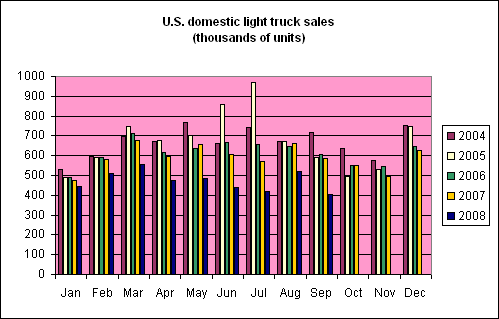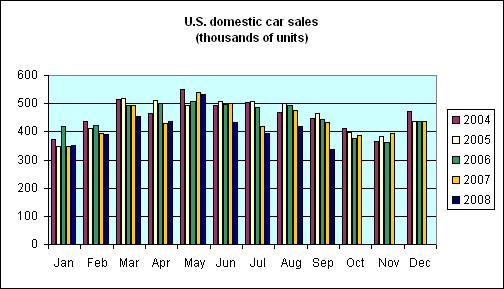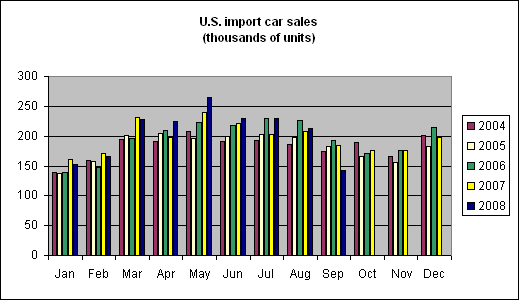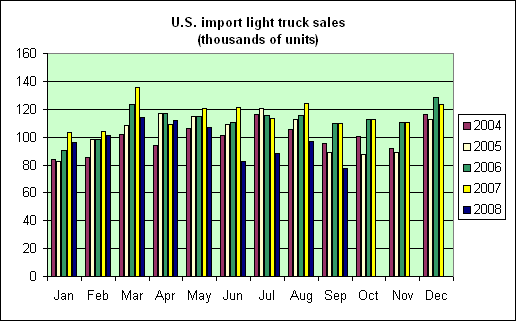U.S. auto sales have been dismal for most of this year. And they just took a turn for the worse.
The light truck category, which includes the once-trendy SUVs, continued to lead the retreat, with seasonally unadjusted September sales of light trucks manufactured in North America down 22% from August and down 31% from September 2007.
 |
Sales of domestic cars, which had been holding up a little better, also fell dramatically, down 19% month to month and 22% year over year.
 |
And imports were also no longer spared, with cars down 23% year over year and trucks down 30%.
 |
 |
All of which is consistent with the view that the U.S. economy has been in recession and took a sharp turn for the worse last month.
Technorati Tags: macroeconomics,
autos,
auto+sales,
economics,
recession
The SAAR sales were 12.498M as compared to
13.716 in August and 12.551 M in July.
The Sept and July numbers were the lows for this cycle.
This is the first info we have on Sept personal consumption expenditures. We know Aug and July
data on real PCE imply that in the third quarter real GDP report real PCE will be down about -2.5%.
The about 9% drop in auto sales from Aug to Sept implies that it will be very hard to see a rise in real PCE in Sept and increases the probability that third quarter real GDP growth will be negative.
In a way, given all the negative impact of the financial crises it is sort of bullish that Sept sales were barely below the July level.
Obviously, what we need is for the Treasury to buy up some of these unwanted gas guzzlers and hold them for a few years until the demand for them is higher. Or maybe they could just put a halt to all repossesions, while simultaneously making it a crime to deny auto loans to anyone who asks for one. Yeah, that’s the ticket!
I saw the VP of Chrysler on TV this morning. He was explaining what a Good Thing it was for them to have this down turn in sales because it gave them time to retool and start designing cars that have decent gas mileage. It wasn’t their fault that they didn’t think ahead: they just respond to what the public wants. But he also described the governments $25 billion as a great motivator so maybe they are a little less one-dimensional than they appear…
In the past week, Political Calculations has had an upsurge in traffic for our Predicting Bankruptcy tool, much of it directed from the Yahoo! message board for General Motors.
Even though the default data set up in the tool shows that GM was highly distressed back in March 2006 (their Altman Z-Score was 0.01 back in those rosy days), updating it with the most recent quarterly data as of 30 June 2008 reveals that things have become much, much worse. Their Altman Z-Score is now -1.35, which is the lowest I’ve personally ever seen.
Perhaps that helps explain why the Congress provided $25 billion for the auto industry in their bailout package. At this time, I don’t believe that even if the full amount went to GM that it would be enough for them to avoid bankruptcy proceedings.
Not to worry Professor. As you noted earlier the government just gave them $25million.
Whither General Motors? I want to know but, frankly, my crystal ball is a bit hazy these days. Is that US$25 billion loan guarantee provision sufficient to keep GM afloat?
Prof., I seriously don’t understand how the bailout bill will help the banks. And I am not just ranting. The plan seems flawed to me.
My doubts are best expressed by this passage:
Why anyone believes that the Treasury plan will prevent widespread economic misery is unclear. Assuming that the Treasury overpays for the so-called “troubled assets” it purchases from banks, it cannot overpay by too much. Let us suppose that it overpays by 20%. In this case, it would effectively give the banks a $140 billion boost. That is a small fraction of what they have written off already, and an even smaller fraction of what they must write off as American wealth continues to shrink. It will help the shareholders of a few big institutions, and that is about it.
Exactly. How does this get the banks the capital they need? Unless the government grossly overpays they are not adding much new $ to the banks. They could already sell these assets on the open market.
I guess the only plus is they would be removing further downside from the banks for these assets, but there could be a lot more failures coming down the pipe and lenders/investors will still be hesitant to put money in these banks until the storm has completely passed, which may be another 9-12 months.
DickF: I wish it were $25 million, alas, I think you typoed, it is $25 billion.
For a piston head’s view of the ongoing agonies of Detroit go to The Truth About Cars, which has been chronicling the GM Death Watch for 201 articles.
GNP asked:
“Whither General Motors? I want to know but, frankly, my crystal ball is a bit hazy these days. Is that US$25 billion loan guarantee provision sufficient to keep GM afloat?”
No. They would have to receive all the $25 billion (it will be split with Ford and Chrysler), and even if they did get it all, it would only reduce their Altman Z-Score to -0.96. Reorganization via bankruptcy is in their future.
GNP: “Is that US$25 billion loan guarantee provision sufficient to keep GM afloat?”
Depends on what you think their problem is. If the money is spent on legacy costs, it won’t keep them alive.
If it were spent on new plant, it might help, but and this is a very big BUT, to expect the same idiots who got them into this swamp to get them out is just plain silly.
Current management at GM has been dysfunctional for a generation. Saturn anyone?
Chrysler has new management, but was so stripped of product and capital when they bought it as to be beyond salvation.
Ford hired a new CEO, but he is one guy fighting against legions of entrenched bureaucrats who have frustrated one CEO after another.
Daveg: You are not the only one. Here are some others who agree with you:
Nobelist Edmund Phelps.
Hedge fund manager John Paulson [no relation to Hank, but he made $15 Billion last year shorting mortgage backed securities].
Currency Trader and leftist activist George Soros.
Thanks Ironman. Was not, but am now familiar with the Altman-Z measure. Yeah, -0.96 is not good.
I understood that the loan guarantee was for all 3 auto-makers. I guessed or assumed that the signal value of the guarantee went beyond the nominal value. The guarantee suggests that the US government will provide more indirect subsidies to keep the thing afloat, if need be.
I suppose there would be little private interest in a less radical reorganization via takeover or merger. However, if the company fails, would not the politics dictate that the US government intervene to save pensions and so forth?
Fat Man: The big 3 have been in trouble since the period of drugs, sex, rock ‘n roll and long shut-down times on the assembly lines in the 1970s. I’m sympathetic to the friendly bullet but wonder if inertia, national pride and American-style welfare statism will keep them on life support a little longer.
These short-term sub-investment grade bond bets are a simple binary play. The only worry is bankruptcy before the maturity date. In that respect, the bet is levered to the Socialist Republic of the United States of America and just how far the state’s err the people’s generosity will go.
Sorry Fat Man. I guess I was still living in the past when Chrysler was bailed out. Yes, we are living in a billion dollar world – or is it trillion. Gosh, we are being blessed by so much inflation I just can’t keep up. Let’s all than Richard Nixon for a floating dollar.
I consider this to be good news. It will cause oil prices to plunge further, alleviating that inflationary force, as well as the confidence drag it provides.
Sure, GDP contracts with lower auto sales, but the trade deficit contracts more, due to a plunge in oil imports.
Bill Heard out of Macon, Ga, one of GMs largest dealers filed bankruptcy. 3200 people out of work. Even people with their cars in for repair can’t get them.
My sister-in-law works in a Pontiac dealer. 2/3 of their business was leasing and there are NO leases. The balance cannot qualify for a loan. They are trying to steer them into used cars.
GNP asked:
“However, if the company fails, would not the politics dictate that the US government intervene to save pensions and so forth?”
Not necessarily. Remember that GM offered pension buyouts to all its long term production workers back in February 2008. By the end of June 2008, some 35,000 of the 74,000 eligible direct GM employees took the offer. The pensions for those employees no longer factor into the company’s equations.
Also recall that per the newest contract between GM and UAW, the pensions for all new employees (and many of the current employees) are now based on a defined-contribution pension plan, which do not have funding risk that the older defined-benefit type pension plans do. As such, there’s not much risk to pensions, so I wouldn’t anticipate government action on that count.
For myself, I’d prefer to see a serious restructuring that doesn’t involve bankruptcy proceedings – the moves they’ve taken would pay off in a more normal business environment. Given the circumstances of today’s less-than-normal market for U.S. automakers, I just don’t think that’s in the cards for GM.
Thanks, I appreciate the comments Ironman.
GMAC closed 200 offices 01 Sept. 2008, primarily due to on-going difficulties in the Residential Capital mortgage unit.
Cerberus Capital Management that owns 51% of GMAC, just put $1 billion into Canadian bank CIBC’s troubled subprime mortgage portfolio. It was an expensive move for CIBC but well received judging by market reaction.
CIBC’s CEO indicated that large pools of capital such as foreign pension funds and sovereign wealth funds are now entering the market through local intermediaries. I wonder if we are nearing the bottom of this financial crisis. Of course pension funds, sovereign wealth funds, and private equity capital firms are well diversified and have the luxury of long-horizon perspectives.
Apologies for the acronym-heavy post (see above).
GMAC = General Motors Acceptance Corporation. It is the financial arm of General Motors and has been involved in the residential mortgage business through its Residential Capital Unit. GMAC has lost money for the last 7 quarters. The coupon bonds pay annualized yields on short-term maturities of close to 40% as I write this. Compare to Ford Credit Canada’s whose similar bonds are yielding ~20% on an annualized basis, or integrated senior Canadian miner Sherritt International whose annualized yields are closer to 7.5% with 8.25% coupons.
Catching up on reading and portfolio-related research here.
Cerberus Capital Management is in negotiations to buy the remaining ~20% of Chrysler. See NYT article.
Cerberus certainly seems to think that the big US auto companies have a future, though I expect Cerberus to dress the companies up for a future, relatively quick sale.